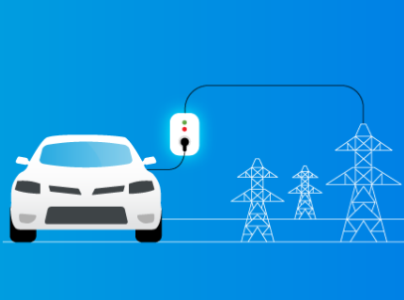Electric Vehicle Charging Stations
White Paper on optimizing EV Infrastructure and EV charging station operations through Artificial Intelligence
Electrical Vehicle Infrastructure and Grid Aware EV Charging Optimization
For scalable deployment of EV infrastructure and grid-aware energy management systems, Netsity proposes artificial intelligence based data analysis, classification or clustering, system control, monitoring, design, and performance optimization for EV charging operations. Non-linear models can help in decision making based on a number of possible criteria including but not limited to electricity markets and pricing, battery degradation, state of charge, electrical losses, routing needs, desired profitability, best charging times for drivers, power system conditions, weather, time related data which can help in minimizing the peak loads on the grid and satisfy EV owner expectations.
White Paper Abstract
With growing electric vehicle fleets for a fossil free transport sector, expansion of charging infrastructure will be an intrinsic part, but it poses new challenges for EV infrastructure operators, utilities, fleet owners, smart cities or municipalities, communities, auto manufacturers, OEMs, apartments and condos, and workplaces. Deploying EV charging infrastructure at scale could result in power grid disruptions, vehicles running out of charge before completing their trips, electrical losses in fast charging technologies, increased cost of operating EV infrastructure and inefficient EV charging. With increasing adoption of BEVs in medium-heavy duty and trucking applications, existing charging facilities designed for passenger vehicles are, to a large extent, unsuitable and the power levels are inadequate. Fleet owners want to run their fleets to full capacity, enabling farther distances, more freight moved, more hours of operation, and positive total cost of ownership. Artificial intelligence technology and machine learning techniques can help with load management, peak shaving, demand response, forecasting dynamic charging load, autonomous process control in EV charging operations, smart scheduling and identifying the best locations for multi-megawatt new loads.
Updated On: August 2021
White Paper Topics
In this White Paper, we have attempted to address challenges in EV infrastruture with key objectives in load management, faster charging, minimizing energy losses, reducing the operating costs, and higher profitability. Following topics are covered:
- Grid-aware energy management in EV infrastructure
- EV charging process control
- EV charging depot planning
- Smart charging with load forecasting
- Variable pricing & minimum GHG emissions

White Paper References
- A Decision Support Framework for Grid-Aware Electric Bus Charge Scheduling. Geoffrey Pettet, Malini Ghosal, Shant Mahserejian, Sarah Davis, Siddharth Sridhar, Abhishek Dubeyy, and Michael Kintner-Meyer. Pacific Northwest National Laboratory, Richland, WA, USA. Vanderbilt University, Nashville, TN, USA
- Application and machine learning methods for dynamic load point controls of electric vehicles (xEVs). Danting Cao, Jonathan Lerch, Daniel Stetter, Martin Neuburger, Ralf Wörner.
Institute of Sustainable Energy Engineering and Mobility, University of Applied Sciences Esslingen, Kanalstreet 33, 73728 Esslingen am Neckar, Germany. Fraunhofer-Institut für Arbeitswirtschaft und Organisation IAO, Nobelstreet 12, 70569 Stuttgart, Germany - Electric Vehicle Charging Load Forecasting: A Comparative Study of Deep Learning Approaches. Juncheng Zhu, Zhile Yang, Monjur Mourshed, Yuanjun Guo, Yimin Zhou,
Yan Chang, Yanjie Wei and Shengzhong Feng. School of Information Engineering, Zhengzhou University, Zhengzhou 450001, China. Shenzhen Institute of Advanced Technology, Chinese Academy of Sciences, Shenzhen 518055, China. School of Engineering, Cardiff University, Cardiff CF24 3AA, UK. School of Software Engineering, University of Science and Technology of China, Hefei 230026, China - Intelligent Charging Algorithm for Electric Vehicles. Jacob Sörme. KTH Royal Insitute of Technology. School of Electrical Engineering and Computer Science
- Machine Learning Approaches for EV Charging Behavior: A Review. Sakib Shahriar. AR Al-Ali (Life Senior Member, IEEE), Ahmed H Osman (Senior Member, IEEE), Salam Dhou (Member, IEEE), Mais Nijim (Member, IEEE). Department of Computer Science and Engineering, American University of Sharjah, Sharjah, United Arab Emirates. Department of Electrical Engineering, American University of Sharjah, Sharjah, United Arab Emirates. Department of Electrical Engineering and Computer Science, Texas A&M University-Kingsville, Kingsville, TX 78363, USA
- Reinforcement Learning for Electric Vehicle Charging using Dueling Neural Networks. Gargya Gokhale, Bert Claessens, Chris Develder. IDLab, Ghent University – imec. Eindhoven University of Technology
- Review on Scheduling, Clustering, and Forecasting Strategies for Controlling Electric Vehicle Charging: Challenges and Recommendations. Ali Saadon Al-Ogaili, Juhana Tengku, Nur Azzammudin Rahmat, M. A. Hannan, Agileswari K. Ramasamy, Marayati Marsadek, Mohammad Faisal. Universiti Tenaga Nasional (UNITEN)
- Ultra-Short-Term Load Demand Forecast Model Framework Based on Deep Learning. Hongze Li, Hongyu Liu, Hongyan Ji, Shiying Zhang and Pengfei Li. School of Economics and Management, North China Electric Power University, Beijing 102206, China
